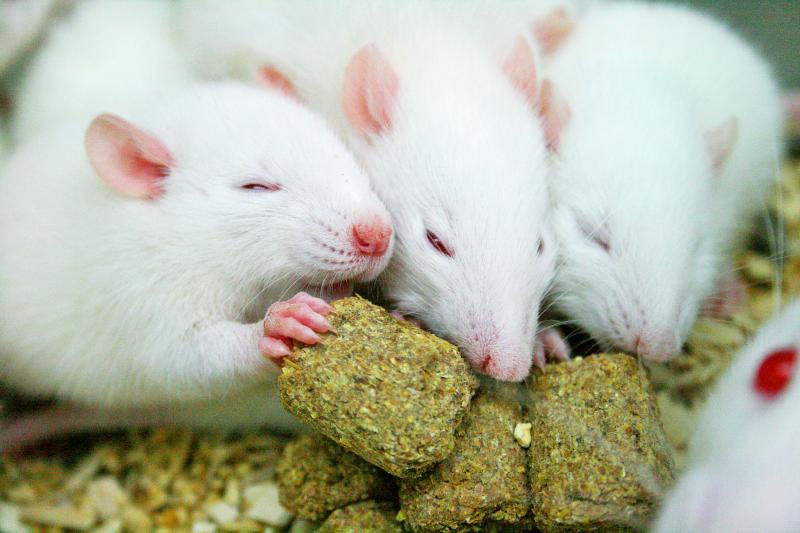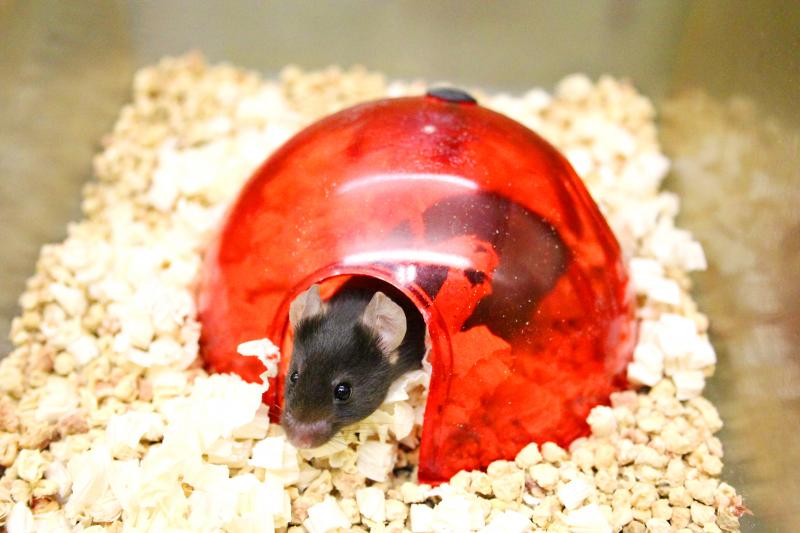Running a facility for laboratory animals not only involves caring for thousands of mice, but also requires a sharp eye to identify each animal’s unique personality.
Whenever the conversation turns to animal personalities, National Laboratory Animal Center director-general Genie Chin’s (秦咸靜) face softens and eyes light up, like a parent excited to gush about their many children.
Apart from the independent hamster, many rodents are social creatures, she said.

Photo courtesy of the National Laboratory Animal Center via CNA
For example, each of the 20,000 mice breeds has their own distinct personality traits, she said.
Some like to “party,” some are maternal and enjoy raising their young, and others even like to drink alcohol, Chin said.
“I have seen some get drunk and collapse into their feed bowl,” she said. “But others dislike alcohol and would rather die than drink.”

Photo courtesy of the National Laboratory Animal Center via CNA
One breed Chin looked after was so sensitive that if frightened while pregnant, it would not care for its pups after giving birth.
It is therefore important not to disturb the mice during pregnancy and until the pups are grown, she said.
“I understand them better the longer I care for them,” she said. “Animals are a lot like people. Of course, I want them to be happy.”
Understanding their personalities is a key part of breeding lab animals — for instance, alcoholism research could be helped by identifying breeds that like to drink, while mice predisposed to gluttony could help with obesity research.
Personalities become apparent through observing their daily routine. If an animal’s behavior changes, it could indicate a health issue.
Wild mice enjoy foraging for materials to “decorate” their homes, so the center provides bedding made from corn husk and wood shavings to simulate natural soil, Chin said.
A healthy mouse given cotton usually rolls it into a ball and begins building a nest, but if it shows no interest, it might not be feeling well, she said, adding that they also choose the spot farthest from their nest to use as a toilet.
Rats, on the other hand, do not like to nest.
“If given a cushion, they will just plop down on it,” Chin said, laughing.
An animal lab requires many people working together to ensure that animals have enough food and water, their homes are in order and to make rounds so that a veterinarian can be called in if anything goes wrong, Chin said.
There is also a team in charge of cleaning and sterilizing items used by the animals, while researchers must regularly administer drugs to the right subjects, take samples and record results, she added.
The center has 10,000 to 20,000 cages of lab mice, meaning that a personnel shortage could have dire consequences.
During the worst part of a local COVID-19 outbreak last year, careful scheduling adjustments were needed to ensure the center stayed in working order, Chin said.
Over the Lunar New Year holiday, all cleaning had to be finished beforehand and schedules carefully planned to ensure there was no lapse in care, she added.
The center is also climate controlled, while sealed cages are equipped with their own air-conditioners with separate intake and exhaust pipes.
This means that the center is just as concerned about power outages as semiconductor fabs are, and it is equipped with multiple levels of backup for the airconditioning system.
If the emergency power supply fails to activate, the air inside the sealed cages cannot last for long, so personnel must immediately open the enclosures.
“There is life inside every cage,” Chin said. “And every life is priceless.”

The inspection equipment and data transmission system for new robotic dogs that Taipei is planning to use for sidewalk patrols were developed by a Taiwanese company, the city’s New Construction Office said today, dismissing concerns that the China-made robots could pose a security risk. The city is bringing in smart robotic dogs to help with sidewalk inspections, Taipei Deputy Mayor Lee Ssu-chuan (李四川) said on Facebook. Equipped with a panoramic surveillance system, the robots would be able to automatically flag problems and easily navigate narrow sidewalks, making inspections faster and more accurate, Lee said. By collecting more accurate data, they would help Taipei

STATS: Taiwan’s average life expectancy of 80.77 years was lower than that of Japan, Singapore and South Korea, but higher than in China, Malaysia and Indonesia Taiwan’s average life expectancy last year increased to 80.77 years, but was still not back to its pre-COVID-19 pandemic peak of 81.32 years in 2020, the Ministry of the Interior said yesterday. The average life expectancy last year increased the 0.54 years from 2023, the ministry said in a statement. For men and women, the average life expectancy last year was 77.42 years and 84.30 years respectively, up 0.48 years and 0.56 years from the previous year. Taiwan’s average life expectancy peaked at 81.32 years in 2020, as the nation was relatively unaffected by the pandemic that year. The metric

TAKING STOCK: The USMC is rebuilding a once-abandoned airfield in Palau to support large-scale ground operations as China’s missile range grows, Naval News reported The US Marine Corps (USMC) is considering new sites for stockpiling equipment in the West Pacific to harden military supply chains and enhance mobility across the Indo-Pacific region, US-based Naval News reported on Saturday. The proposed sites in Palau — one of Taiwan’s diplomatic allies — and Australia would enable a “rapid standup of stored equipment within a year” of the program’s approval, the report said, citing documents published by the USMC last month. In Palau, the service is rebuilding a formerly abandoned World War II-era airfield and establishing ancillary structures to support large-scale ground operations “as China’s missile range and magazine

A 72-year-old man in Kaohsiung was sentenced to 40 days in jail after he was found having sex with a 67-year-old woman under a slide in a public park on Sunday afternoon. At 3pm on Sunday, a mother surnamed Liang (梁) was with her child at a neighborhood park when they found the man, surnamed Tsai (蔡), and woman, surnamed Huang (黃), underneath the slide. Liang took her child away from the scene, took photographs of the two and called the police, who arrived and arrested the couple. During questioning, Tsai told police that he had met Huang that day and offered to